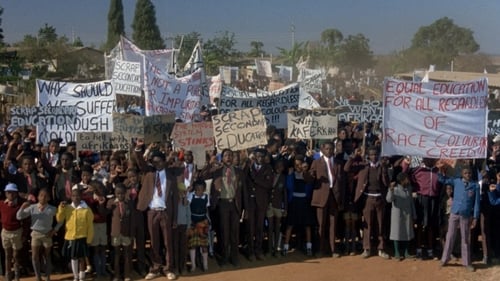
Thandeka, a young Black journalist, lives in fear of Johannesburg's past. She's so troubled that she can't work, and her relationship with her 13-year-old deaf daughter Mangi goes from bad to worse. One day Me'Tau, an elderly woman, arrives at the newspaper's office. Ten years earlier, Thandeka witnessed the murder of the woman's daughter Dinéo by the secret police. Me'Tau wants Thandeka to find the murderers and Dinéo's body so that the girl can be buried in accordance with tradition. What Me'Tau couldn't know is that Thandeka has already paid for her knowledge, for having dared stand up to the apartheid system run by the whites. Meanwhile, Mangi secretly prepares a Zulu love letter: four embroidered images representing solitude, loss, hope, and love, as a final gesture towards her mother so that she won't give up the fight.

Herself
The struggle to eradicate apartheid in South Africa has been chronicled over time, but no one has addressed the vital role music plays in this challenge. This documentary by Lee Hirsch recounts a fascinating and little-known part of South Africa's political history through archival footage, interviews and, of course, several mesmerizing musical performances.

Margaret
1976년 남아프리카 공화국. 20세기에도 남아있는 영국령 식민지이며 약 490만의 백인이 4배 규모인 2300만 흑인을 총칼과 공포 정치로 억압하고 있는 곳이다. 벤 뒤 뜨와는 요하네스버그 학교에서 역사를 가르치는 선생님이자 사회에선 동료들에게 존경받는 인물이며 집안에선 자상한 가장이다. 그는 남아프리카 태생 백인사회의 인물로 안정과 행복속에 나날을 보낸다. 적어도 그의 앞에 두개의 죽음이라는 엄청난 사건이 던져지기까지. 어느날 벤의 정원사인 고든의 아들 조나단이 인종차별정책의 철폐를 요구하는 시위도중 실종된다. 고든은 그의 주인인 벤에게 아들을 구해달라고 부탁을 하게되고, 벤은 정원사의 아들의 석방 탄원을 올리지만, 당국은 조나단이 시위도중 사망했다고 통고해 온다. 하지만 고든은 아들이 심문도중 심한 고문에 의해 살해되었다고 확신하며 강경한 자세로 사체를 보게 해 달라고 요구한다.


